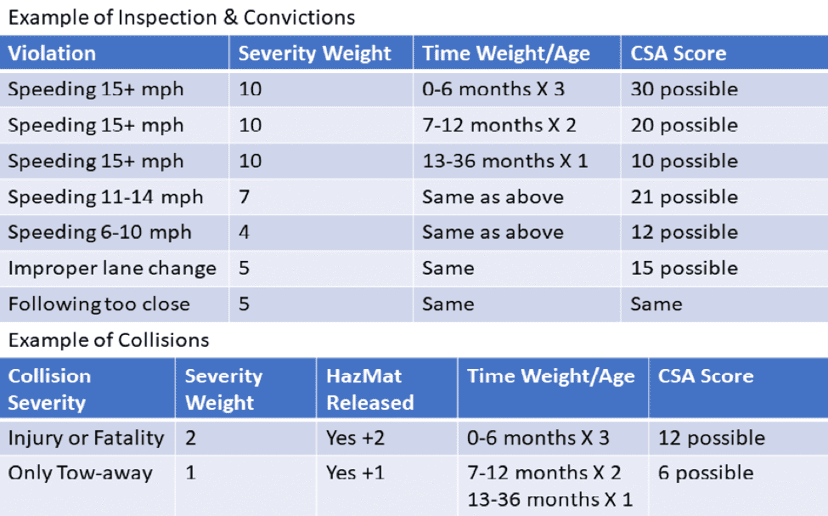
Compliance, Safety, and Accountability (CSA) scores are primarily assessed based on roadside inspections and collision reports filed by law enforcement officers (LEO) through the state’s DMV. This data measures a driver or carrier’s safety performance. It is used to identify or predict at-risk drivers and carriers who are potentially unsafe and prioritize interventions for them.
CSA Score General Overview
A driver or carrier’s CSA score gets gathered in several steps. Step one consists of safety events or tickets where shortcomings are noted, violations discovered and reported during roadside inspections, convictions, and LEO accident reports.
These are then placed into groups known as Behavioral Analysis and Safety Improvement Categories or (BASICs). These are:
Category #1 - Unsafe Driving, speeding, improper lane change, following too closely, etc.
Category #2 - Compliance with Hours of Service (HOS), required 8-hour break, maximum driving times, 11/14 or 60/70, Form & Manner, or falsified log violations
Category #3 - Driver Fitness, driving while under Out of Service (OOS) order, expired medical, or missing endorsements
Category #4 - Alcohol & Controlled Substances, use, possession, or refused test
Category #5 - Maintenance, brakes, lights, tires, etc.
Category #6 - Hazardous Material (HazMat) Compliance
Each violation assessed CSA points are then weighed according to age when monthly reports get pulled. Violations within the previous six months are multiplied by three; six to twelve months, times two; and out to 24 months for carriers and 36 months for drivers get weighed at face value.
The relativity of future crash risks decides the severity weight for each violation. Simply put, the violations considered more likely to contribute to future collisions are given a higher severity weight. Each possible violation was assigned a severity “weight” number between one and ten. Ten is the highest severity indicator. Additionally, two points get added when a violation is severe enough to warrant an OOS order.
The following table illustrates a few examples of CSA scores:
The total of severity weights for violations from one event or inspection in one BASIC category cannot exceed 30. The 30 severity point cap is then multiplied by a time weight to determine the CSA score.
CSA Score Percentile Adjustments
The FMCSA’s Safety Management System (SMS) will then group carriers that have basically the same size (total vehicles, and/or miles driven) versus the number of exposures (roadside inspections, convictions, or collisions) and places them in a percentile range between 0 and 100.
SMS then prioritizes carriers or driver for interventions or inspections based on that percentile. 0 to 50 is considered safe, 51 to 74 get an optional recommendation for intervention or inspection, and 75 to 100 will receive some type of intervention, such as an inspection, or worse case, an OOS order.
Carriers and drivers can Improve their CSA score in any category by staying violation-free during new events, a roadside inspection (a clean inspection nets bonus points), and collisions, Violation-free driving lowers scores in each category because the older a violation is, the lower the time weight. Violations for carriers drop off their record after 24 months and for drivers after 36 months.
Other Methods to Lower Your CSA Score
Use the Driver Vehicle Inspection Report (DVIR) before every trip and immediately report mechanical shortcomings to maintenance if you cannot fix it yourself. Carriers are responsible for ensuring safety problems get repaired before letting the vehicle on the road or signing off the paperwork stating it is not a problem.
More importantly, complete a post-trip inspection and take the vehicle in for maintenance if there are problems. Maintenance will have more time to fix the issue. Pre-trip is usually too late to get anything fixed, and the load might get transferred to another vehicle, which will cost you money.
A DMV Hearing might be necessary when you have accumulated too many Negligent Operator Treatment System (NOTS) points. Just as the FMCSA’s SMS measures exposure, a DMV panel can consider miles driven (both CMV and private), mitigating circumstances, or invalid convictions to extend up to six, eight, or ten the number of NOTS points you can get before a suspension. The standard is four points within 12 months, six within 24, and eight within 36 months before a suspension. So, this could keep you on the road.
To be eligible for increased NOTS points consideration, a driver must:
- Request a DMV NOTS hearing and appear when scheduled
- Not hold special endorsements for an ambulance, a school/tour/youth bus, farm labor, be a public paratransit, or hauling hazmat
- Not have accumulated four points or more within 12 months, six in 24 months, nor eight within 36 months attributable to the operation of a private vehicle
Although having an attorney is not required, it is recommended because they know traffic law and which traffic codes changes could get a conviction or paid fine removed from your record.
Obviously, the best method is not to get NOTS points by fighting every ticket or at-fault accident determination by LEO.
Likewise, you can challenge CSA points received on the FMCSA Data Q website. However, because the DMV reports data to the FMCSA, a DMV Hearing might be required to get points removed. You can request a DMV Hearing here.
Just as every CDL holder knows, you must challenge every traffic ticket. DMV reports convictions to FMCSA, not tickets. Hire a dependable attorney and go to court. It might save your career.
Kings County
Call the trucker-friendly firm of Bigger & Harman, APC (661) 349-9300. Se habla Español (661) 349-9755. We routinely handle traffic tickets for truckers in Hanford Traffic Court in Kings County. Hanford County Court is a tough court with a strict judge, and many attorneys dislike practicing here. However, we have had great success fighting trucker equipment violations, overweight trucks, and speeding violations here where other attorneys have folded.
Consider this review on Yelp, left by Raman, a CDL holder from Bakersfield, CA. He wrote, “I highly recommend these guys if you got any traffic ticket just call them they will take care of that. I got [a] speeding ticket they [got] dismissed that one and saved my commercial license and points. Thank you so much guys.”We can’t promise we will get your ticket dismissed, but we will guarantee sound legal advice, our best effort, and keep you updated every step of the way.
Send them an email, attorney@biggerharmanlaw.com.
Join the Bigger & Harman Facebook business page to get updated traffic law tips and links to other full-length articles.
References:
The 2018 CA Commercial Driver Handbook .pdf
Thebalance.com A Guide to CSA Point Values and Transportation
BigRoad Blog, So What Are these CSA Scores all About?
The DMV portal for NOTS points
